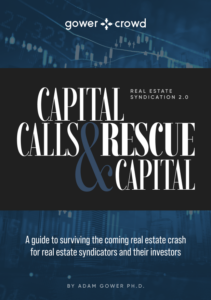In real estate syndication, we often hear about how the introduction of crowdfunding has “democratized” the market and, effectively, has created an “inverse pyramid.” In many ways, these claims are true. When compared to years past, most major capital markets can now be accessed by almost anyone, enabling people to hold $5,000 stakes, or even less, in a given project. Naturally, especially in the digital world, our marketing strategies have been forced to change.
Reaching larger audiences, building brands via social media, and finding new marketing mediums have all revolutionized the ways sponsors find and target potential investors. But even in the midst of these revolutionary changes, it is important for sponsors to realize an unavoidable truth: targeting individuals and families with ultra-high net worth can still be incredibly effective.
Targeting individuals and families with ultra-high net worth can still be incredibly effective.
The family office is a term used to describe families with such wealth as to need to hire and create their own wealth management team (or office). While maintaining a family office can cost hundreds of thousands of dollars per year for some families, this investment is inevitably worth it; employing an investment team to manage their assets allows for a bespoke investment strategy that applies philosophical and ethical considerations to economic risk profiles that are directly aligned with the family's unique values, .
Looking to expand your Real Estate Investing knowledge? GowerCrowd’s insights are detailed ensuring you learn all you need to know.
Generally, families that have their own office will have at least $10 million worth of assets. Typically, these offices run an extremely conservative investment strategy that is designed to preserve wealth for future generations, think long-term, and avoid systematic risks. Avoiding risks involves many things, such as investing in stable bond markets and investing in assets that appreciate as well as by generating income. It is also means adhering to the fundamentals, such as the need to create a diversified portfolio. This need for diversification, even amongst the most conservative holders of wealth, will frequently involve significant allocations to real estate.
Knowing that family offices and other small organizations of ultra-wealthy individuals are interested in committing to long-term real estate projects, it is important for sponsors of all sorts to give these offices some attention. This remains true even for sponsors that are used to operating on a much smaller scale. By simply thinking about how a digital marketing campaign might target these conservative, long-term thinking organizations, sponsors can discover principles of marketing that are applicable at every level.
So, how can a sponsor effectively market to a family office?
Learn how to raise money from family offices - and any other high net worth investor. Enroll in the Investor Acquisition System training today.
How to Gain Credibility With Family Offices
Traditionally, one of the most common marketing strategies—regardless of industry—is to make whatever it is you are selling to sound as appealing as you possibly can. This often works when selling to “the masses” because most people are looking for the best values they can find. But when selling to the ultra-wealthy, such as those with family offices, over promising by appearing too 'salesy' is one of the surest ways to push your target audience away.
In fact, over promising often indicates to potential investors that you are either unrealistic in your expectations and/or are comfortable underdelivering with your final product. When targeting the very rich—who are typically rather conservative with their investments—it is better to under-promise and over-deliver. In fact, being conservative yourself in your projections and in setting expectations is an approach that is preferable no matter who is your target investor.
Instead of orienting your pitch exclusively to a best case scenario, incorporate three scenarios that have been carefully underwritten; best case, worst case, and most likely outcome. This demonstrates a prudent approach to your investment process, allows investors to decide for themselves which scenario is 'most likely,' and still allows you to put in front of your prospects an optimistic, best case scenario. Plus by having a worst case scenario properly formulated, you protect not only your investors but also yourself.
Wealthy individuals have heard enough pitches to know who is serious and who is trying to simply get their money. Being realistic with your expectations is one of the surest ways to establish trust—by establishing yourself as a pragmatist as much concerned with protecting the downside as you are with maximizing the up, you build confidence and increase the likelihood of converting a prospect into being an active investor.
Do Family Offices Have a Long Term Perspective?
When compared to the average investor, wealthy investors also typically have a more future-oriented mindset. They don’t need to earn a quick return in order to stay afloat; what they want is a predictable return that will allow them to maintain their wealth at minimum and grow it at best.
Naturally, this increased level of patience can have a direct impact on the digital marketing strategies a sponsor might consider using. The need for developing a credible, reliable, and trustworthy brand—doing everything you can to minimize the perception of risk or uncertainty—will be especially important. To project an image of seriousness, along with a sense of long-term financial stability, it will be crucial to be able to talk in terms of years, even decades, rather than months.
Understanding Real Estate as a Conservative Investment
Following the 2007-08 housing crisis, and especially during the Coronavirus crisis, many people consider real estate (as a whole) to be a relatively stable an investment, though not one without its risks. While home ownership is still the primary vehicle for building wealth in the United States, real estate investing has become sufficiently mainstream that investors now allocate increasing proportions of their wealth to the asset class, and afford it the same level of attention and scrutiny as they do the stock market.
In order to address this additional attention real estate has enjoyed in recent years, and to appeal to the family office or the ultra-wealthy, it will be crucial to demonstrate how real estate can actually be considered a conservative investment vehicle. While there is no particular investment that is without its risk, re-packaging your pitch to emphasize real estate investments as a conservative alternative, especially during downturns when investors are looking for ‘shelter in a storm,’ will likely help you maintain your target audience’s attention.
Get access to our FREE weekly newsletter exclusively covering the latest updates from the real estate crowdfunding world
The Importance of Portfolio Diversification
Of course, one of the reasons real estate should be considered a relatively conservative investment is that it offers investors a tremendous opportunity to diversify their already existing holdings. Diversification is something that all enterprises—such as family offices—operating on a large scale will eventually need to pursue. While they are correlated, the real estate market does not move in lockstep with the stock market, the bond market, or any other market.
Investing in real estate is not something that should ever be considered risk-free, but by diversifying your exposure to risk, you can systematically decrease the likelihood that a single trend or event will cause the entirety of a portfolio to depreciate. This, along with the fact that real estate is a physically finite asset, is among the primary motivations behind wealthy families entering into the market.
Furthermore, diversification applies two fold to a well structured investment portfolio; on the one hand it offers an alternative to traditional investments such as stocks and bonds and on the other, within real estate there are diversification opportunities.
These opportunities have only become widely available, even to family offices, since the advent of crowdfunding reduced investment minimums allowing for more investments to be made with the same total capital.
When pitching to a family office, don't attempt to make the case for your deal by suggesting it is a replacement for another kind of investment, but rather that it is complementary to other investments in balancing the investor's portfolio.
Developing a Unique Value Proposition
Recognizing that the ultra-wealthy do not want to be oversold to, it is crucial for sponsors and capital fundraisers to present their own unique value proposition. There are countless different investment vehicles available for these family offices to choose from—if a firm claims that they are the best at absolutely everything and can truly provide everything the prospective investor might want, what this really says to potential investors is that the firm doesn’t specialize in anything.
Building on the need for authenticity, rather than promising “everything” or “the best returns ever,” and being confident in your own unique value proposition is one of the surest ways for a firm to develop a competitive edge. Rather than focusing on “real estate” or even “commercial real estate,” you can focus on one aspect of how you gain an edge in an otherwise crowded field - maybe by articulating your approach to implementing security in Class-C buildings, or have cracked the code to workforce housing by creating a new formula for rental units. Be specific and highlight to your unique approach.
By being different from the many alternatives, wealthy, risk-averse investors might actually be interested in investing. They want to see that, unlike the alternatives, you are an expert in a given area, and have a novel solution even if (or especially because) your defined area of expertise is rather narrow.
Family Offices Like Consistency
Lastly, one of the surest ways to impress a prospective, wealthy investment group is to demonstrate a sense of consistency because it will help build trust in your ability to project results and to deliver.
As an enterprise, you will need to develop a consistent brand, consistently deliver on promised returns, and consistently be finding new ways to improve your broader operations. But effective daily habits can also begin at the personal level, too. Doing things as simple as consistently maintaining your social media presence (particularly LinkedIn), answering emails from your family office prospects on a daily basis, and making sure that nothing is put off longer than it needs to be will help reinforce the notion that your firm, in particular, is a serious contender.
In addition to relentless integrity, seriousness is among the most valuable traits a sponsor can develop.
Conclusion
Even in an era marked by the democratization of commercial real estate, the need to appeal to family offices remains an important component of any capital formation campaign. Furthermore, by learning how to market to this unique group, it can be easy to discover some of the principles that are universally demanded throughout the industry.
Integrity, consistency, realistic expectations, specialization, and industry savvy can all help sponsors attract a crowd of serious investors and move closer to achieving their long-term fundraising goals.
If you enjoyed this article, consider reviewing some of the other resources available to you here at GowerCrowd, below.
If you have only just started in real estate development, have completed no deals, have no email list, but know you want the freedom and wealth being a real estate developer brings, then I suggest your first step is to start evaluating deals so you can recognize a good one when you see it.
Here’s where you should start. You’ll learn everything you need to know – the different types of real estate, different development strategies, how real estate cycles influence the market, and all about due diligence.
If you want to find deals and raise money for them so you can start your real estate development business, then learning how to conduct due diligence so you can pitch your deals better to investors is a great place to start.
If you’ve already purchased one or more real estate project and are seeing more opportunities than you can finance, then now is the time to start building your investor network so you can finance all your next deals quicker.
You’ve already got some momentum; now start finding and educating prospects about what you’re doing so you can build an email list of people to pitch to when you’re ready to raise money for your next deal.
This is what we build for private clients all the time – it’s called the Investor Acquisition System and you can access the entire program right here so you can find prospects, and convert them into being deep pocketed, repeat investors in your deals.
If you are a seasoned pro with multi-cycle experience, a substantial portfolio, a decent deal pipeline, and find yourself spending too much time raising equity capital because you’re still doing it in-person, then it’s time you put technology to work for you.
The wonderful thing about doing this is that you’re not going to be doing anything different than you’re already doing and, guess what, you’ll never have to sit through investor meetings again.
Sounds crazy I know, but I lay the whole thing out for you in this white board workshop where I personally show you exactly what it takes for you to transform your equity raising into a fully automated, capital raising machine so you can find new investors while increasing commitments from your existing network.






